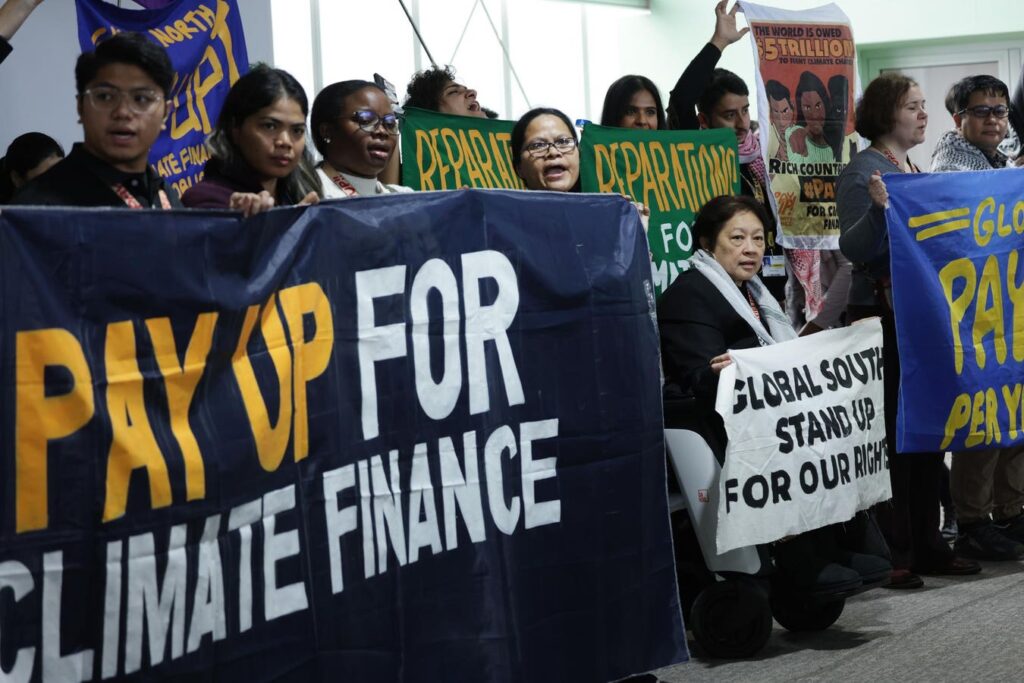BAKU, AZERBAIJAN – NOVEMBER 21: Activists demonstrate for climate finance for the global south on … [+]
As 2024 marked a watershed year for global climate negotiations, historic breakthroughs in financing and renewed tensions over loss and damage shaped the future of international climate action. With COP29 laying the groundwork for 2025, this year offered both hope and caution.
First there was the “other COP,” COP16 ,which focused on biodiversity and was held in Colombia. Leaders there made bold commitments to preserve biodiversity decisively as climate disasters intensified, threatening ecosystems, livelihoods, and geopolitical stability. Though fraught with scandal and controversy, COP29 also ended with an agreement to triple climate finance for developing nations demonstrated renewed solidarity. Yet, unresolved issues like funding for loss and damage and the role of fossil fuel phaseouts left critical questions for the future.
The Rise of the Global South
Developing countries, united through the G77+China bloc, demanded greater accountability from wealthier nations for historical emissions. A key highlight was their success in securing commitments to increase financing for climate resilience and mitigation projects.
The Global South’s leadership extended beyond advocacy. Countries like Kenya and Barbados pioneered innovative financing mechanisms, such as debt-for-climate swaps, demonstrating solutions that blend environmental justice with economic pragmatism.
2024 also witnessed unprecedented youth involvement, with delegates under 35 playing integral roles in negotiations. Activists highlighted connections between climate, peace, and security, emphasizing the need for inclusive decision-making. As a blog from the United Nations System Staff College noted, young leaders are uniquely positioned to push for systemic change, bridging gaps between policy and grassroots action.
Breakthroughs in Climate Financing
The agreement to triple climate finance for developing nations was celebrated as a historic milestone, particularly by countries vulnerable to rising sea levels and extreme weather. These funds will be critical for projects ranging from early warning systems to reforestation.
However, financing for loss and damage—a key demand from vulnerable nations—remains uncertain. While a dedicated fund was established at COP28, contributions have fallen short, raising questions about the efficacy of voluntary pledges.
Debates over phasing out fossil fuels resurfaced as a sticking point. Wealthy nations like the U.S. and EU faced criticism for insufficiently ambitious targets, while fossil fuel-exporting nations lobbied to dilute language on decarbonization. Laurence Tubiana, CEO of the European Climate Foundation, explained, “The future of climate policy depends on stronger alignment between national interests and global priorities. Without bolder commitments, we risk undermining decades of progress.”
The 2025 Negotiation Agenda
As COP29 concluded, the stage was set for next year’s negotiations, which will focus on enforcing accountability and addressing gaps in implementation. With the global stocktake of the Paris Agreement approaching, countries must demonstrate tangible progress on their commitments. The delegations left the meetings with a task to reconcile domestic policies with international commitments, particularly on fossil fuel reduction and renewable energy investments.
Additionally, the U.S. election looms as a pivotal factor. As the Center for American Progress highlighted in a November 204 report, the new administration will significantly influence global climate ambition, with implications for multilateralism and funding mechanisms. Advocates argue that future policies must prioritize equity, addressing the disproportionate burden faced by marginalized populations. The Climate Justice Alliance continues to push for systemic change, emphasizing grassroots-led solutions.
The 2024 climate negotiations underscored both the potential and the limitations of international cooperation. As the world looks to 2025, the question remains: will countries rise to meet the challenge, or will incremental progress continue to define global climate action?


